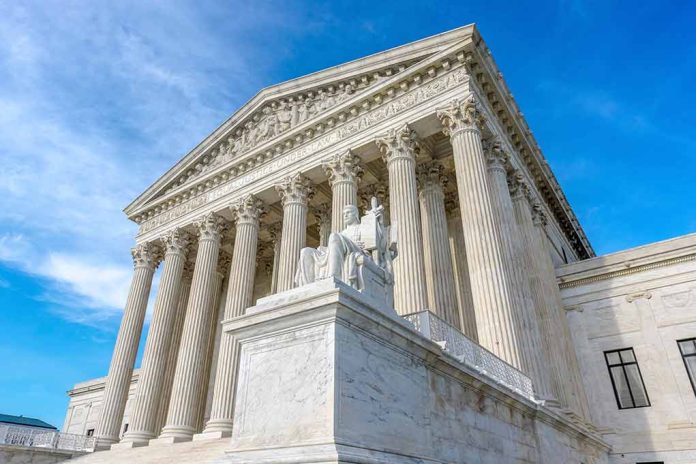
Energy companies may soon get their day in court to challenge California’s aggressive vehicle emissions standards as the Supreme Court appears inclined to revive their lawsuit against regulations they claim unfairly target the fossil fuel industry.
Key Takeaways
- The Supreme Court is considering whether to revive the Diamond Alternative Energy LLC v. EPA lawsuit challenging California’s authority to set stricter vehicle emissions standards than federal requirements
- Energy companies argue California’s regulations cause economic harm by pushing electric vehicles and functioning as a “quasi-federal regulator” on climate policy
- The D.C. Circuit Court previously dismissed the case for lack of standing, but several Supreme Court justices appeared sympathetic to the companies’ right to sue
- California defends its regulatory independence based on historical congressional allowances for state-specific emissions standards
- A ruling in favor of the energy companies could significantly impact state-level climate regulations nationwide
Supreme Court Signals Openness to Energy Companies’ Challenge
The Supreme Court heard oral arguments in a pivotal case that could determine whether California can continue setting its own vehicle emissions standards that exceed federal requirements. The lawsuit, brought by Diamond Alternative Energy LLC (a subsidiary of Valero Energy Corp.), American Fuel and Petrochemical Manufacturers, and other industry groups, challenges the EPA’s decision to grant California waivers that allow the state to implement stricter tailpipe emissions regulations aimed at accelerating the transition to electric vehicles.
During oral arguments, several justices appeared receptive to the companies’ argument that they have standing to bring the case. The D.C. Circuit Court had previously dismissed the lawsuit, ruling that the companies lacked standing to challenge California’s regulatory authority. However, the Supreme Court’s questioning suggested many justices believe the energy companies have a legitimate claim of economic harm from California’s aggressive push toward 100% electric vehicle sales by 2036.
The U.S. Supreme Court has agreed to review a critical case that could determine whether oil companies have the standing to challenge California's clean-car standards. https://t.co/BUW2WwMEIK#ClimateChange #CleanAir #ElectricVehicles #California #ShipandShoreEnvironmental
— Ship & Shore Environmental (@ShipnShoreEnv) January 17, 2025
Constitutional Questions About State Authority
At the heart of the case is whether California should have special authority to set emissions standards stricter than those established by the federal government. The energy companies argue that the Clean Air Act’s provision allowing California to receive waivers from the EPA creates a situation where a single state effectively functions as a “quasi-federal regulator” on climate change issues. They contend this arrangement raises significant constitutional concerns about federalism and proper separation of powers.
The petitioners further argue that California’s push for electric vehicles directly harms their business interests in fossil fuels and that the state’s regulations have outsized influence because other states often adopt California’s standards. Seventeen states currently follow California’s stricter rules, creating a regulatory patchwork that the energy companies claim imposes unfair economic burdens on their industry while effectively creating de facto national policy through a single state’s actions.
California Defends Regulatory Independence
California authorities defend their emissions regulations by pointing to the state’s long history of air quality challenges and Congress’s explicit decision to grant the state special regulatory authority. Under the Clean Air Act, California can request waivers from the EPA to implement its own vehicle emissions standards to address the state’s unique environmental conditions. President Biden’s EPA has supported these waivers, allowing California to move forward with its ambitious climate agenda that includes eliminating sales of new gasoline-powered vehicles by 2036.
California’s defenders argue that the regulatory flexibility granted to the state has been a cornerstone of environmental policy for decades and serves as an important laboratory for climate solutions. They maintain that Congress specifically intended to give California this authority and that the energy companies’ complaints about economic harm should be directed at lawmakers rather than addressed through litigation challenging the state’s established regulatory framework.
Potential National Implications
The Supreme Court’s ultimate decision could have far-reaching consequences for climate policy across the United States. If the Court allows the lawsuit to proceed and the energy companies eventually prevail on the merits, California’s ability to lead on emissions regulations would be curtailed. This would align with President Trump’s broader efforts to roll back environmental regulations and support domestic energy production. Conversely, if California’s authority is upheld, the state would maintain its influential position in setting ambitious climate policies that often become de facto standards for much of the American auto market.
The Court’s ruling on whether the case can proceed is expected by the end of June 2025. While this decision will only determine if the lawsuit can move forward in lower courts rather than settling the underlying regulatory questions, it represents a critical juncture in the ongoing tension between state-level climate initiatives and the interests of the fossil fuel industry. The case exemplifies the complex interplay between federalism, environmental policy, and economic interests that continues to shape America’s response to climate change.
Sources:
- Justices Hear Case on California’s Auto Emissions Standards | C-SPAN.org
- Supreme Court Seems Inclined to Let Energy Companies Sue California Over Emissions Rules | The Epoch Times




